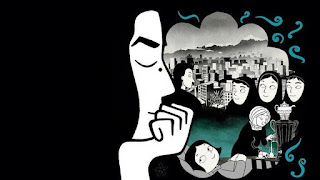The Taikon Sisters
by Alva Karlsson, Malgomajskolan
To be a
part of the Romani people hasn’t been easy through the years. Not in Sweden,
not anywhere. Not many knew who the Roma were or where they came from. So many
rumors spread like wildfire and the Roma were then seen as dirty and filthy,
and people thought that they stole things. This made them persecuted. The Roma
got beaten, discriminated and called names. The Romani people didn’t have a
place in society, but two of many people who fought for their rights were Rosa
and Katarina Taikon, who were themselves Roma and sisters.
The Romani
people are said to have come to Sweden around 1500. They are a wandering
minority and knew a lot of metals and ironwork, which was highly appreciated in
countries like Sweden. But it was so appreciated that the Roma became slaves is
Eastern parts of the world. The Roma were used for their talents. They didn’t
become slaves in every country, but they were still badly treated. No one knew
where the foreign people came from, and there were many rumors that they were
Russian spies, which they weren't. This rumor gave the Roma the discriminatory
name “tattare” in Sweden. But there was something thrilling and magical about
this people; they could play neverseen instruments and could sing in an unknown
language. The Roma could not get hired and have a job, but they could perform
for us. Many Romani circuses started to grow, and became popular. 1939 came the
awful Holocaust which killed thousand of people, including the Roma. Many Roma
tried to flee from this, and came to countries like Sweden and England for
help. But when they came, they got discriminated.
Rosa Taikon
was the oldest daughter of the amusement park owner Johan Taikon in Sweden, and
with her little sister Katarina they fought for the Romani people’s rights in
society. The Taikon family wasn’t allowed to stay in one place more than 10
weeks because of the law against vagrancy, this made it hard for the family to
get enough of money. So just at 10 years old Rosa started working to help her
family, and then educated herself to become a silversmith which was a family
tradition among the men. And through her smithing she could modernize the
Romani silver jewelry and designs which ended up in Sweden's National Museum.
But the thing that Rosa Taikon was more known for was to be an apostille for
equal rights for the Roma. Katarina Taikon was only 9 months old when her and
Rosa’s mother died from tuberculosis. Katarina ended up in many orphan homes
through the years because of that. Katarina became really interested in the Romani
rights as well and fought for equality. After Rosa’s and Katarina’s brother got
murdered, they wrote the book Zigenerska (translated
as Gypsy Woman) together in 1963. In 1969, Katarina started
to write the popular book series Katitzi
which got translated in many other languages like German for example.
The Taikon
sisters were really active in the debate about the Romani people, and spread a
lot of information about the earlier outlandish people. A society like Sweden
didn’t know that much about what the Romani people wereo r what they did, this
made the minority intimidating and open to speculate around. So just to talk
about the Roma helped the society to accept them, and Katarina’s books helped
just with that. In 1982 suffered from a cardiac Katarina Taikon at just 50
years old and remained in coma until passing away in 1995, but Rosa kept
fighting for the romani people. In 1985 became Rosa Taikon had her own
programme on national Swedish radio and in 2013 she won the Olof Palme Award
for her contribution to human rights. In January of 2017, Rosa died at the age
of 90.
You can’t
say that the Roma have had it simple through the years, and you can’t say that
it’s easy for them today either. Many haven’t even heard about what they are,
and still there are many rumors about what people think they are. The Taikon
sisters made a big difference and were big role models. With Rosa’s and
Katarina’s effort so early in such a difficult time, so the information and
knowledge of the roma could spread and it humanized them. The Roma could feel
safer and be a part of society without having to flee. Rosa Taikon and Katarina
Taikon made a big difference and fought for the human rights, which we all
should be grateful for.




Kommentarer
Skicka en kommentar